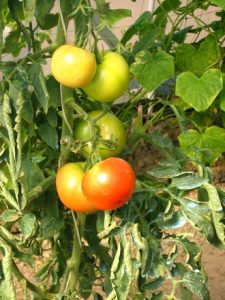 If I had been writing in the days of the Remington Manual typewriter, I would have regarded what I had written in Juneof 2011 with a frown, yanked it from its carriage, and commended the wad of paper to its final resting place in the circular file. But since we live in the digital age, I was able to go back to the virtual trash bin and retrieve the article I had written a month and a half after my dad’s death.
If I had been writing in the days of the Remington Manual typewriter, I would have regarded what I had written in Juneof 2011 with a frown, yanked it from its carriage, and commended the wad of paper to its final resting place in the circular file. But since we live in the digital age, I was able to go back to the virtual trash bin and retrieve the article I had written a month and a half after my dad’s death.
June 2010
“My garden lies fallow. Small stands of prairie grass and clover punctuate composted mulch laid down to prevent weeds like the ones that are now thriving in soil once tilled by my own generative hands. By this time of year, the beans should be making their territorial claims on makeshift trellises. The first round of my summer-long fight with tomato loving squirrels should be in full-swing. By now, home-grown basil should be folded into every omelet and salad prepared in my summertime kitchen. But there are no trellises, no beans, no squirrels, no tomato blossoms or fruit, and no basil. My garden lies fallow now.
I had always imagined that my dad’s death would bring with it a kind of sweetness, a sense of victory. For the last thirty years or so, I had constructed an ecosystem in which the very best in my dad was able to show up whenever he was around me. Toward that goal, I worked like a Jewish settler coaxing fertility out of the desert clay. There were boundaries to be established, weeds to be pulled, fertilizer that had to be applied over and over again. There was a round of psychotherapy in my twenties, and again in my thirties. There were countless retreats, and years of spiritual direction. There were Adult Children of Alcoholics meetings. And eventually, year-after-year, decade after decade, a balance was established that allowed my dad and I to be a blessing to one another. Through a process of repetitious pruning, dad knew what I considered to be useless weeds, and, for the most part, he kept them out of my garden. I had always imagined that his death would provide me a victory lap to savor what had been accomplished over a lifetime together. But there are no victory laps, and despite all the tilling, pruning, weeding, and feeding, my garden lies fallow now.
My dad’s death somehow managed to breach the walls of what we had built together. Somehow the unseen root systems of long-dormant perennial pests have sprouted full-grown. Old weeds, once considered long-gone have come back. The arms-length I had placed between the dysfunction of thirty years ago, and the present time zone were obliterated.”
Easter
Just after writing these paragraphs, I held them at arms length and surveyed them. “Too personal…too unfinished,” I thought to myself. “Who in their right mind would want to read stuff like that? I am not about to publish this thing!” And so I threw it away, and created a different article…something with the rough edges sanded off…something with a brighter, shinier veneer over the top of it.
So why resurrect (pun intended) such an article on, this, the day of pastel colors, Peeps, bunnies, brunch, and bonnets? I think it has something to do with a moment in graduate school when I was sitting through the 500th presentation of how some professor, or guest lecturer, or psychotherapist was presenting a brilliant case where they untied some Gordian Knot, and everyone lived happily ever after. Even then, I had the suspicion that things weren’t so tidy as all that. I longed for a presenter who would have the courage to stand in front of us and tell us about a case where he or she had struggled, and learned a lesson the hard way. The cases that have most changed how I practice as a clinician have been those cases that didn’t resolve with a stroke of brilliance—cases where wisdom was purchased at the price of suffering.
For those ignorant of the natural rhythms of traditional farming, the fallow garden looks like nothing more than a waste of revenue. The knowledgeable farmer knows better. What looks like a period of non-productivity, is part of a cycle of regenerativity. Our walk with God involves significant periods when things don’t feel so productive. Our destiny is Easter joy, and peace, but our journey on the way frequently involves descent, rather than ascent; darkness, rather than light; fallow periods, rather than productive ones in order to regenerate a whole new form of fruitfulness.
It seems to me that Easter completes Lent, rather than erasing it. This summer, when I bite into the glory of a vine ripened Beefsteak tomato, that I planted way back in April, I will be biting into the fruit of a garden allowed to go through a process of regeneration. The ability to live Easter joy is contingent upon a willingness to embrace the inevitable fallow seasons of our lives. One of the messages of Easter, is that what you had thought to be nothing more than a wasteland in your life is precisely the area where immense fruitfulness can arrive in due time.
